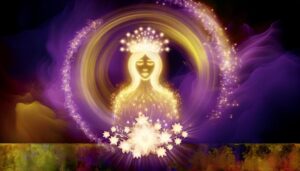Spiritual Meaning of the Name Noah
The name Noah, rooted in Hebrew etymology, symbolizes rest, comfort, and tranquility. Spiritually, Noah reflects divine covenant and peace, embodying faith, resilience, and obedience to divine will.
The biblical narrative of Noah's Ark represents refuge, hope, and renewal amidst adversity. Culturally, Noah is revered for his righteousness and spiritual perseverance, transcending time and geography.
His story offers reassurance of divine grace and acts as a powerful metaphor for transformation and renewal. Stemming from ancient texts to modern interpretations, Noah's name continues to inspire and resonate deeply.
Explore further to understand its rich and multifaceted layers.

Key Takeaways
- Noah signifies peace, solace, and comfort, derived from the Hebrew root meaning 'rest.'
- The name embodies divine covenant, symbolizing trust, faith, and enduring bonds, represented by the rainbow.
- Noah's story in the Bible symbolizes faith, resilience, and obedience to divine will.
- In various cultures, Noah represents righteousness, spiritual perseverance, and divine favor.
- Modern interpretations of Noah emphasize environmental stewardship, moral responsibility, and interconnectedness of humanity and nature.
Etymology of Noah
The name Noah, derived from the Hebrew root 'נוח' (Noach), translates to 'rest' or 'comfort,' encapsulating a sense of peace and solace. This etymology offers profound insights into the spiritual significance of the name, suggesting a deeper connection to tranquility and relief.
The linguistic roots symbolize a state of serenity and a reprieve from life's turbulence, reflecting an archetypal yearning for inner harmony. By understanding this etymology, one can appreciate the symbolic value embedded in the name Noah, recognizing it as a bearer of calm and a beacon of hope.
This understanding transcends mere nomenclature, providing a timeless reflection on the human desire for rest and comfort amidst the chaos of existence.
Noah in Biblical Texts
In the rich tapestry of biblical narratives, Noah emerges as a pivotal figure, embodying themes of divine covenant, judgment, and renewal. His covenant with God signifies a profound promise and a new beginning for humanity, while the Great Flood narrative encapsulates both destruction and rebirth.
Noah's Ark, a vessel of salvation, symbolizes refuge amid chaos and the enduring spirit of hope.
Noah's Covenant With God
Marked by divine promise and profound symbolism, Noah's covenant with God stands as a cornerstone in biblical texts, representing hope and renewal after the cataclysmic flood. This sacred agreement not only signifies God's promise to never again destroy the earth by flood but also establishes a foundational relationship between the divine and humanity. The covenant is symbolized by the rainbow, a sign of divine mercy and commitment.
| Aspect | Meaning |
|---|---|
| Rainbow | Divine mercy and promise |
| Noah's Altar | Human acknowledgment of divine grace |
| God's Promise | Assurance of stability and renewal |
| Covenant | Binding agreement between God and humanity |
| Earth Rebirth | Symbol of new beginnings and hope |
Through this covenant, Noah becomes a pivotal figure, embodying humanity's potential for faith and resilience.
The Great Flood Narrative
A cataclysmic deluge, sent by divine will, reshapes the world and signifies a moment of profound transformation in biblical history.
The Great Flood narrative, recounted in the Book of Genesis, reveals a divine decision to cleanse a world marred by human corruption and violence. Noah, a figure of unwavering faith and righteousness, emerges as the chosen one to preserve life and secure a new beginning.
The floodwaters symbolize both destruction and purification, a duality that underscores the spiritual ramifications of divine judgment.
As the waters recede, the emergence of a cleansed earth represents hope, renewal, and the reestablishment of divine order. Noah's journey through the deluge encapsulates the themes of faith, obedience, and divine mercy.
Noah's Ark Symbolism
Emerging from the flood's aftermath, Noah's Ark stands as a profound symbol of faith, resilience, and divine covenant in the biblical texts. It encapsulates humanity's journey through chaos towards renewal, embodying lessons that remain timeless.
Symbolically, Noah's Ark represents:
- Faith in Divine Guidance: Noah's unwavering faith in God's command to build the Ark, despite societal disbelief, exemplifies trust in divine wisdom.
- Resilience Amidst Adversity: The Ark's endurance through the floodwaters highlights the resilience needed to survive life's tumultuous challenges.
- Covenant and Renewal: Post-flood, the Ark signifies a new beginning and God's promise to never again destroy the earth by flood, marking a covenant of hope and continuity.
These symbols resonate deeply, offering insights into spiritual perseverance and divine assurance.
Symbolism of the Ark
The Ark in the story of Noah serves as a profound symbol of refuge and divine preservation amid chaos and destruction. It represents a sanctuary where life is safeguarded against overwhelming forces, embodying the idea that faith and obedience to divine will can provide protection and salvation.
The Ark's construction, meticulous and guided by divine instructions, underlines humanity's capacity to cooperate with the sacred in the face of existential threats. The vessel's journey through the tumultuous floodwaters further symbolizes a passage through transformation and renewal.
As a beacon of hope and resilience, the Ark reassures that amidst adversities, divine grace offers a path to survival and continuity, inviting reflection on the deeper meanings of security and spiritual fortitude.
Noah and Divine Covenant
The story of Noah is intrinsically entwined with the profound concept of a divine covenant, marked by God's promise to Noah and humanity.
This sacred agreement is symbolized by the ethereal beauty of the rainbow, serving as a celestial reminder of hope and divine protection.
Through these symbols, the narrative of Noah transcends its historical roots, offering spiritual insights into trust, faith, and the enduring bonds between the divine and humankind.
God's Promise to Noah
How profoundly does God's promise to Noah encapsulate the essence of divine covenant and eternal hope? This sacred pact, forged after the deluge, symbolizes God's unwavering commitment to humanity. Reflectively, the covenant comprises three key elements:
- Divine Assurance: God pledges to never again destroy all life with a flood, offering a foundation of trust and security.
- Renewed Creation: The post-flood world represents a fresh beginning, emphasizing redemption and new possibilities.
- Eternal Sign: The covenant is marked by a perpetual sign, reminding humanity of divine grace and compassion.
This covenant not only signifies a profound relationship between the divine and the mortal but also serves as a demonstration of enduring hope and the promise of a harmonious existence.
Symbolism of the Rainbow
In the aftermath of the flood, the rainbow emerges as a powerful symbol of God's enduring covenant with humanity, representing both divine mercy and the promise of perpetual hope. This vivid arc in the sky not only marks the end of divine wrath but also heralds a new era of reconciliation and trust between the Creator and His creation. The symbolism of the rainbow can be understood in multiple layers:
| Symbol | Meaning |
|---|---|
| Colors | Diversity and unity |
| Arc Shape | Bridge between heaven and earth |
| Light | Divine presence |
| After the Storm | Renewal and peace |
| Covenant | Unbreakable divine promise |
Thus, the rainbow stands as an eternal reminder of God's unwavering commitment to life and love.
Peace and Rest
Symbolizing tranquility and comfort, the name Noah carries profound spiritual significance related to peace and rest. This name evokes a sense of calm and serenity, deeply rooted in ancient traditions.
The spiritual essence of Noah can be understood through:
- Inner Calm: Noah embodies a state of inner peace that transcends external chaos, offering a sanctuary within oneself.
- Harmonious Existence: The name suggests living in harmony with nature and others, fostering a life of balance and mutual respect.
- Renewal and Rejuvenation: Noah signifies a restorative rest that revitalizes the spirit, promoting healing and renewal.
These elements collectively highlight Noah's role as a beacon of tranquility, inviting individuals to embrace a life of peaceful existence.
Flood as Renewal
The flood in the story of Noah represents a powerful symbol of renewal and transformation, washing away the old to make way for new beginnings. Within the deluge lies a profound narrative of cleansing, where the waters serve as a metaphor for purifying the world of corruption and decay.
This act of divine intervention signifies not just destruction, but a carefully orchestrated reset aimed at fostering a fresh start. Noah, as the chosen vessel of this renewal, embodies the hope and promise of a rejuvenated existence.
The flood's aftermath, marked by the emergence of a revived earth, invites reflection on the cyclical nature of life and the perennial possibility of rebirth and new opportunities.
Cross-Cultural Interpretations
How do diverse cultures perceive and interpret the spiritual essence of the name Noah? Across different societies, Noah embodies themes of survival, renewal, and divine communication.
- Ancient Hebrew Culture:
Noah is revered as a righteous man chosen by God to preserve life, symbolizing obedience and divine favor.
- Islamic Tradition:
Known as Nuh, Noah is a prophet who exemplifies patience and unwavering faith amidst adversity, reinforcing the idea of spiritual perseverance.
- Modern Western Context:
Noah's story is often viewed as a metaphor for environmental stewardship and moral responsibility, highlighting the interconnectedness of humanity and nature.
These cross-cultural interpretations underscore Noah's enduring legacy, reflecting universal values that transcend time and geography. Each perspective enriches our collective understanding of his spiritual significance.
Modern Spiritual Significance
In today's spiritual landscape, the name Noah resonates deeply, embodying themes of renewal, resilience, and a profound connection to the divine.
As contemporary society navigates unprecedented challenges, the essence of Noah serves as a beacon of hope and transformation. His journey symbolizes an enduring trust in a higher power, inspiring individuals to seek solace and strength within their spiritual convictions.
The narrative of Noah's Ark, with its promise of a new beginning after the flood, mirrors our own quests for personal and collective rebirth. The name Noah is more than a historical relic; it is a timeless call to embrace faith, adaptability, and the unwavering belief in a brighter, divinely guided future.
Noah in Popular Culture
Reflecting the enduring legacy of its biblical origins, the name Noah has permeated various facets of popular culture, symbolizing resilience and renewal across literature, film, and television. This timeless figure continues to inspire contemporary narratives, embodying themes of hope and perseverance. Notable appearances include:
- Literature: Noah Calhoun in Nicholas Sparks' novel *The Notebook*, portraying a story of enduring love and commitment.
- Film: Darren Aronofsky's *Noah* (2014), a modern retelling of the ancient tale, delving into human strength and moral dilemmas.
- Television: Noah Bennet in *Heroes*, a character embodying determination and protective instincts amidst chaos.
These representations underscore Noah's symbolic significance, reflecting humanity's quest for renewal and resilience in the face of adversity.
Conclusion
The name Noah, steeped in rich etymology and profound biblical narratives, symbolizes peace, rest, and divine covenant. The ark embodies salvation and renewal amidst chaos, while the flood signifies both destruction and rebirth.
How does this ancient name continue to resonate across cultures and eras, echoing themes of survival and divine promise? In modern times, Noah's spiritual significance endures, offering a timeless reflection on humanity's journey and connection to the divine. This narrative of Noah serves as a reminder of resilience and faith, bridging ancient teachings with contemporary perspectives on hope and renewal. Similarly, the spiritual significance of Josephine emerges as a symbol of grace and strength, encapsulating the virtues of perseverance and divine purpose. Together, these names connect generations, offering enduring lessons on humanity’s capacity for transformation and its unwavering link to higher principles.






